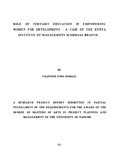| dc.description.abstract | The success of development efforts depends upon making women full partners. They must be
enabled not only to contribute their efforts, but also to share equally in the benefits of
development projects .. To be certain, tertiary education, by itself, is not a panacea, but it is
necessary, if often insufficient, condition for the advancement of women and girls. It is in this
that the journey out of poverty and towards employment and decision- making power begins.
Providing the means through which such women can gain access to learning opportunities is a
major task for national planner's intent upon improving the lot of women. (UNESCO, 1994).
Education of women is a societal responsibility. All available resources should be harnessed to
meet this challenge: those of non-government organizations and the private sector as well as
those of government at all levels. Yet, without improved access to education, the advancement
of women will be stymied. Improved knowledge and skills are necessary to enable women and
their families to escape from poverty. Education is a prerequisite to most forms of remunerative
employment, including self-employment. Hence, while education is not the only means by
which the problem can be resolved, it is a vital and essential step in promoting the progress and
well-being of women. The study tried to find out the role of tertiary education in empowering
women in development a case study of the Kenya Institute of Management. The target
populations were female students from Mombasa Branch. A total of 825 female students were
used for the study. Both secondary and primary data were used; primary data was collected using
questionnaire which were first tested to find out its validity and reliability. Simple random
sampling method was used to get the students who were to fill the questionnaire in Mombasa
branch. Once the data was collected, it was analyzed descriptive analysis to determine whether
relevance of the course, mentorship, attachment policy and education scholarship contributes
lllwarJ empowering women for development. All the respondents agreed that training is a key to
empowering women for development. The female students also agreed that relevant courses
provide the required skills and professions to individuals which enable them be competitive in
the job market. They are also certain that mentorship will increase their professional skills and
knowledge and improve the chances of job opportunities. The respondents agreed that through
attachment they are given chance to put in practice the skills and knowledge they have acquired
in real work experiences. This empowers them for development of the Nation. Also the
respondents agreed that through sponsorship the less privileged women are able to access tertiary
education which will equip them for development of the Nation. The study recommends that the
Institute should make available mentorship and education sponsorship so that the students are
aware of them and make use of them to empower them for development. The study recommends
similar studies should be conducted to other tertiary Institution and Institution of higher
education. Also a study should be carried out to see whether women occupy senior position in
the organization after attaining the required skills and knowledge. | en_US |

